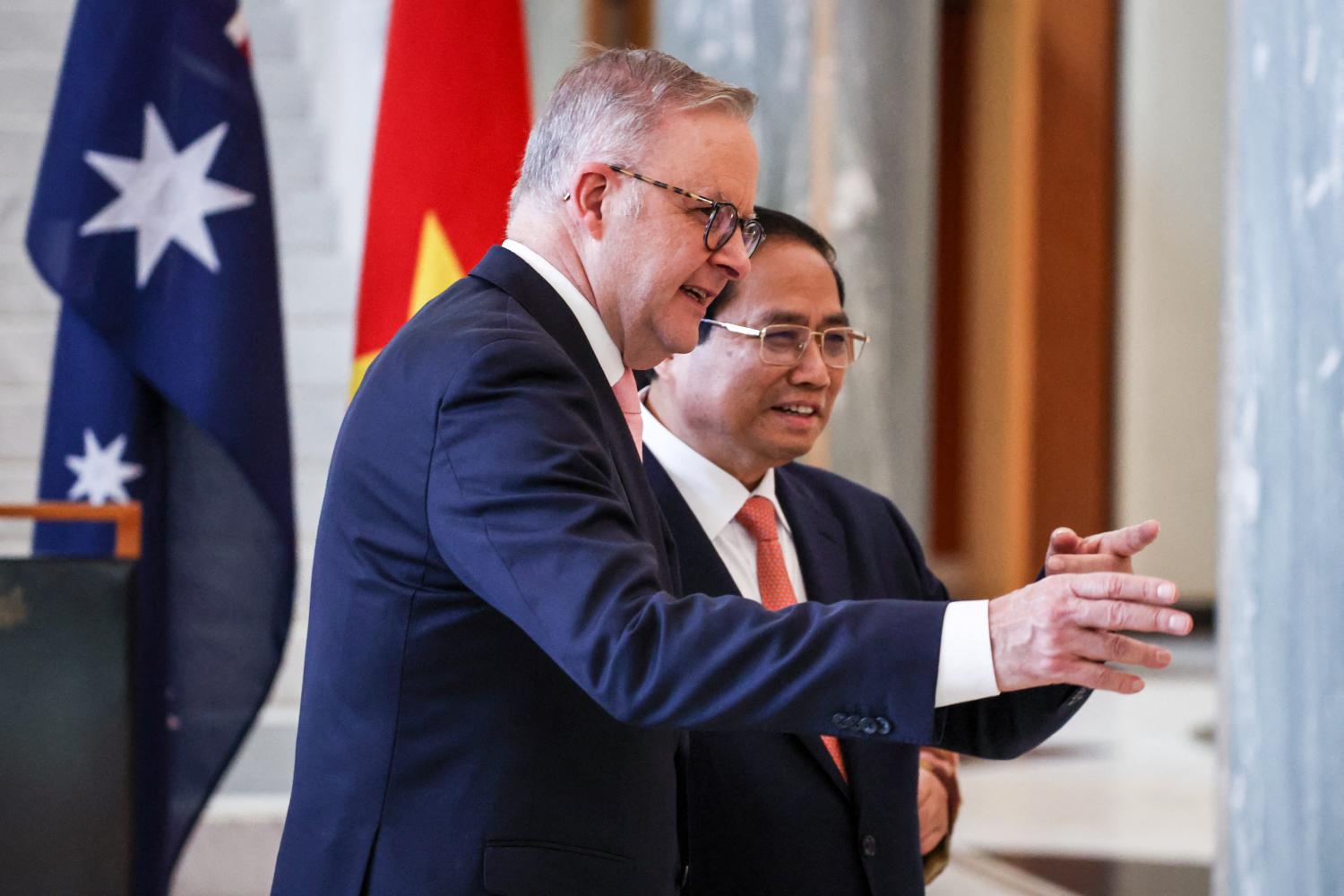Last week, Australia and Vietnam announced they were elevating their ties to a Comprehensive Strategic Partnership (CSP), marking six years of improved relations since their strategic partnership (SP) was first declared in 2018. Relations between the two Indo-Pacific middle powers have come a long way since the Vietnam War.
SPs commit partners to enhanced cooperation on shared issues and interests in a wide range of domains without a mutual defence commitment. CSPs are expanded agreements that build upon SPs, and they typically do have a military dimension.
The CSP with Vietnam forms part of a coordinated push by Australia to elevate its Asian partnerships under both Labor and Liberal governments. Beginning with the Rudd government in 2008, the number of SPs with Asian countries had increased to 10 by the time the Morrison government left office. Recent examples include a strategic partnership with the Philippines in 2023 and comprehensive strategic partnerships with South Korea and ASEAN in 2021. Australia signed a CSP with China in 2014.
The flexibility of these partnerships means that they can begin with certain goals in mind and later come to serve totally different purposes. One of these purposes is to “de-risk” Australia’s relations with China.
In July 2023, Australia was invited by Japan to attend the G7 summit in Hiroshima. Prime Minister Anthony Albanese notably endorsed a joint statement issued by the G7 leaders urging the need to “de-risk” trade relations with China.
Talk of “de-risking” began with a keynote speech delivered by European Commission President Ursula von der Leyen in March 2023 calling for “de-risking rather than decoupling” as Beijing moved into “a new era of security and control”. The term has since gained salience in strategic discourse in the US, with National Security Advisor Jake Sullivan arguing for “de-risking and diversification” to allow domestic industries to effectively compete with China.
De-risking is a gradual effort by one country to mitigate the risks of economic interdependence with another. De-coupling, on the other hand, is a sudden and complete separation of economic ties, which could harm both sides.
However, the meaning of de-risking is very much dependent upon where one stands. Some see it as a credible strategy to insulate economies and widen strategic choices. Others see it as simply de-coupling by another name.
The most glaring indication of de-risking in the Australia-Vietnam CSP is the proposed establishment of a Ministerial Dialogue on Energy and Minerals to “drive cooperation in energy and resource sectors, including in critical minerals supply chains”. The CSP coincides with recent moves by Blackstone Minerals and Australian Strategic Minerals to invest in Vietnam’s abundant critical mineral deposits, estimated to be world’s second largest after China at 22 billion tonnes.
Australia has become an increasingly preferred supplier of coal and LNG to Vietnam. Although both have committed to net-zero emissions by 2050, Australia aims to take the lead in assisting Vietnam’s Just Energy Transition that balances net-zero and its vision to become fully developed by 2050. In particular, the Albanese government’s Invested: Australia’s Southeast Asia Economic Strategy to 2040 plans to provide Hanoi with the natural resources, infrastructure, skills, and technological capability to reach its long-term goals.
Higher education also stands to benefit from de-risking. Vietnam has become a lucrative source of students for Australian universities seeking to diversify away from dependence on China and India. In 2023, almost 33,000 Vietnamese students were studying in Australia, an increase of 46% from 2022. This contrasts with only a 6% growth from China, a figure likely influenced by domestic factors and the tensions caused by a series of diplomatic incidents during the Covid-19 pandemic.
De-risking requires open sea lanes to move trade between Australia and Vietnam, but that has been challenged by China’s militarisation of the South China Sea. The upgrade of the annual Australia-Vietnam security dialogue to the ministerial level complements enhanced commitments to intelligence sharing and cooperation on maritime security, which will help Australia and Vietnam better forecast potential future disruptions to maritime trade caused by growing tensions in the South China Sea.
These commitments to strengthened cooperation on maritime security are built on two decades of confidence building between the Australian and Vietnamese militaries. The Defence Cooperation Program, established in 1999, and the 2010 Memorandum of Understanding on Defence Cooperation, have allowed Australia and Vietnam to engage in limited training activities between their navies and Special Forces.
However, despite the Vietnam-Australia CSP pledging enhanced economic and security ties, Vietnam does not share the same desire to de-risk its relations with China.
Last year, Hanoi endorsed China’s “community of common destiny” and announced new deals on infrastructure, political cooperation and maritime security. Vietnam’s neutrality and long-standing preference for assuring peaceful ties with Beijing has seen Hanoi deepen its CSP with Beijing to reduce scepticism over growing relations with the US.
So, Australia should not assume the CSP signifies close alignment with Vietnam on how to deal with China. Vietnam’s recent CSPs with the US, Japan and South Korea similarly emphasise expanded infrastructure, investment and trade ties as foreign enterprises increasingly exit the Chinese market for safer shores.

